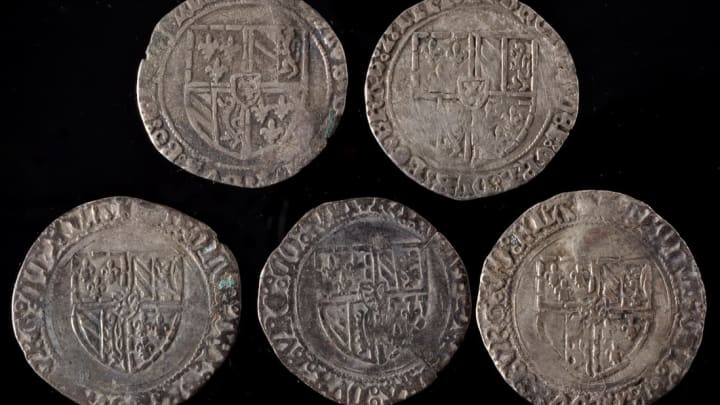From Viking silver to Roman bronze, amateur treasure hunters in Europe locate all kinds of buried treasures with their metal detectors. Now, a new hoard is making headlines: As the ChronicleLive reports, the caretaker of a primary school in Northumberland, England used his own electronic device to find a stash of Medieval-era silver coins buried underneath the school's playground.
The discovery occurred at Warkworth Church of England Primary School, in the tiny village of Warkworth. The school sits near a well-preserved medieval castle, which was once owned by the House of Percy, a powerful noble family.
"The collection was found in the playground by the caretaker who had asked to metal detect and was granted permission," Fred Wyrley-Birch, director of Newcastle auctioneers Anderson & Garland, who will auction off some of the coins, told Mental Floss. "The hoard was then declared a treasure trove, and was valued and authenticated by The British Museum."
The cache consists of 128 silver coins forged during the 15th and early 16th centuries, a period of transition in England from the Medieval era to the Renaissance era. It includes groat and half-groat coins, which date back to the reigns of monarchs King Edward IV and King Henry VII, and nine coins from the 1460s associated with Charles the Bold, Duke of Burgundy. Together, they're worth £11,000 (nearly $15,000 US).
Theories abound as to why the coins were buried: The presence of a large medieval castle just up the hill has prompted Wyrley-Birch to concoct "a romantic tale" of a "large tax bill on its way to the local sheriff, which never made it to its intended destination."
Meanwhile, Andrew Agate, a local finds liaison officer for the Portable Antiquities Scheme, to which discoveries of treasures are reported, proposed to ChronicleLive that "the owner may have felt in danger during turbulent times of Scottish incursions," he said. "The intention would have been to retrieve them, but for some reason, this never happened."
The British Museum didn't opt to purchase the silver currency, so the primary school caretaker and the landowner, the Diocese of Newcastle, agreed to split the buried treasure. On Wednesday, September 13, Anderson & Garland will sell 66 coins at auction, all of which belong to the Diocese.
"The collection is a rare opportunity to buy interesting coins that have been underground for 500 years," Wyrley-Birch says. "Most types of treasure troves are kept for the nation and placed in a museum, but for unknown reasons, this one has been given back."
You can check out some of the coins for sale below:




[h/t ChronicleLive]
